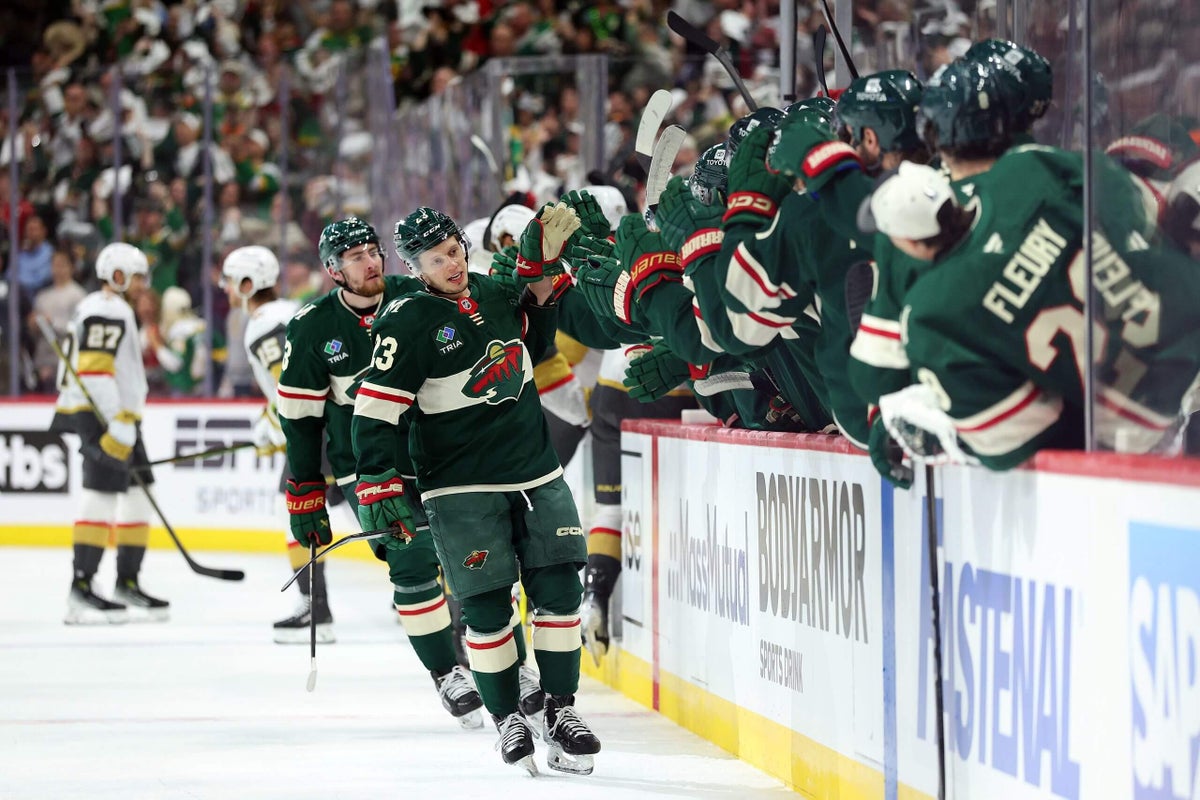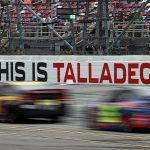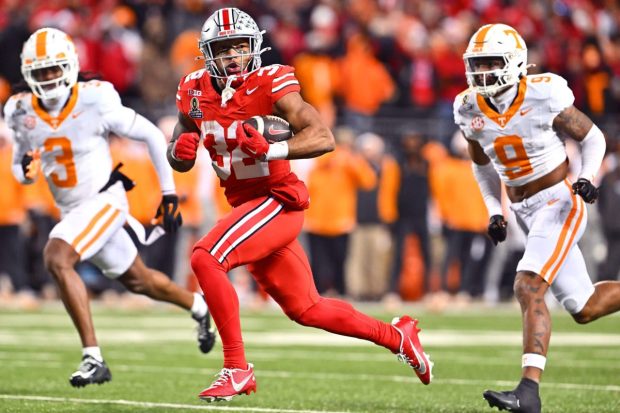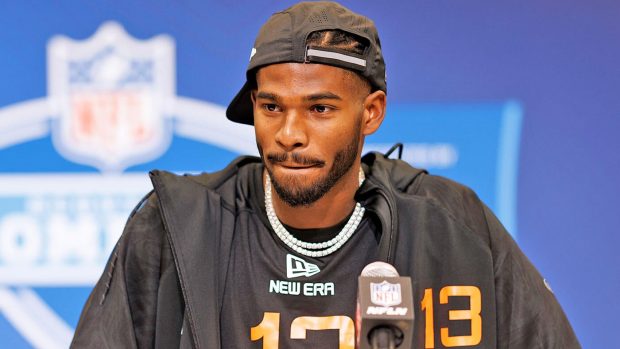

ST. PAUL, Minn. — Truth be told, we’ll probably never know exactly what’s going through Marco Rossi’s head right now and the emotions flowing through his being.
He’s too mature, too much of a pro, to voice that to the public.
But after landing on the fourth line for 43 seconds in Game 1 and most of the subsequent two games and after being taken off the top power-play unit since the return of Joel Eriksson Ek and signing of Zeev Buium, Rossi — a pending restricted free agent who has heard his name in trade rumors for a year — must be worried about his future, both short-term in these playoffs and long-term beyond them.
Advertisement
Rossi, one of the Minnesota Wild’s hardest workers and certainly one of their most jovial, is always smiling.
It’s been hard not to notice that that smile hasn’t been there as much these past four or five days.
“I mean, my family’s always … they just want that I’m happy … and I tell them I’m happy,” Rossi, grinning, said after scoring the first goal of his playoff career — and a huge one, at that — and having his first career multi-point playoff game in Thursday’s Game 3 victory over the Vegas Golden Knights.
Marco Rossi gets his first career playoff goal on the feed from Yakov Trenin. 2-0 #mnwild lead pic.twitter.com/xeI3xvro5k
— Alex Micheletti (@AlexMicheletti) April 25, 2025
Rossi was the Wild’s second-leading scorer in 2024-25, with career highs of 24 goals and 60 points in his second full season. Through large parts of this season, he was the one making the big plays and scoring the big goals for Minnesota, whether it be in extra-attacker situations, overtime or with his team-leading seven power-play goals.
After making the all-rookie team in 2023-24 and finishing sixth in Calder Trophy voting, the 23-year-old center battled through a couple of nagging injuries this season but was still always available on such an injury-ravaged team, playing his second consecutive 82-game season.
Yet when the playoffs began, Rossi started on the third line with Marcus Foligno and Gustav Nyquist and ultimately found himself on the fourth line with Yakov Trenin and Justin Brazeau for one shift in Game 1 and most of his even-strength shifts in Games 2 and 3. He’s logged just 32 minutes, 29 seconds, in the series — third-lowest on the team, just in front of Trenin and Brazeau.
It has to be confusing for Rossi why he didn’t get the benefit of the doubt and was the one chosen to be demoted to the fourth line rather than perhaps being given a shot on the second line with Marcus Johansson and Mats Zuccarello.
Advertisement
The reality is that Hynes had to do something to fix the third line. Foligno may have had 11 of his league-leading 27 hits in Game 1, but the line as a whole was completely ineffective. The Foligno-Rossi-Nyquist trio had a 0.8 expected-goals percentage in Game 1, per MoneyPuck, which is barely registerable. Ryan Hartman has always worked well with Foligno. He was elevated, and ever since, Hartman has made a giant impact on this series, and the line is at 43.5 percent expected goals.
It’s clear the Wild felt Rossi had hit a wall down the stretch of the regular season and were worried the pace and physicality of the playoffs could be an issue. They also saw how good the Golden Knights’ bottom-six was in Game 1 and how their fourth line boasted 50 regular-season goals and were curious if Rossi could help turn the fourth line into more of a scoring threat.
THAT’S A WILD OT WIN! 🤩
Marco Rossi wins it for the @mnwild in @Energizer overtime! pic.twitter.com/JxX3e61bVh
— NHL (@NHL) April 6, 2025
While the Trenin-Rossi-Brazeau line’s expected goals is still only 16.7 percent in 13.3 five-on-five minutes (tied for worst in the playoffs among lines that have played at least 10.5 minutes with the Tampa Bay Lightning’s third line of Conor Geekie-Nick Paul-Gage Goncalves), the actual goals — which matters a wee bit more — is 1 thanks to Rossi burying Trenin’s pass from the slot after Adin Hill’s first-period turnover for a 2-0 lead Thursday night.
And in the victory, Brazeau played one of his best games with the Wild, assisting on Rossi’s goal, drawing a power play and having a Wild-high eight hits in 7:54 of ice time.
“Our last game (Tuesday in Las Vegas) (didn’t) really (go) our way, but that happens,” Rossi said of a game where the fourth line got pinned in their zone for a few extended shifts. “It’s not always that easy. So we’ve just got to keep going and keep continuing like (Thursday).”
Advertisement
You have to hand it to Rossi for keeping his head up and chugging along during what has to be a difficult time. It’s not often the team’s second-leading scorer is instantly dropped to the fourth line after one effective game in his playoff debut.
“It’s never easy to go from a top line to the fourth line and you know he’s probably pissed personally,” goalie Filip Gustavsson told The Athletic. “But in the locker room, he doesn’t show it, and then he goes out on the ice and scores a big goal like that. It’s him just trying to say, ‘I should be up there.’ And I think that’s what you need. And I think that the coaches probably like that, too. It’s maybe like a little test, like to try to push him even more. And he’s not backing down. He’s just pushing on, so it’s good for him and good for us.”
When initially explaining his decision to put Rossi with Trenin and Brazeau, Hynes noted that Rossi was a solid two-way center who can finish, so he felt playing him with two bigger bodies could provide scoring. In saying that, Hynes said he wanted more from Rossi and when you get to this time of year, “there is another level of speed and compete” that Rossi needed to get to.
He added, “I am confident that Marco is going to help us and be a difference-maker in this series.”
Hynes turned out to be right.
“Just because you move a player around … doesn’t mean you don’t believe in them or you don’t think he’s a good player,” Hynes said Thursday night. “You have to make decisions. We go through a lot of things when we make decisions, and then there is some instinct to it. But we deal with our players. If we make changes and we talk to them, they need to know what we expect and what needs to happen.
“And it’s no different than Marco, and he was a difference maker in the game. So we’ll keep moving forward with him, and hopefully, as I said, I had a feeling he was going to be a factor in the series. He’s a really good player for us. But there are some times when a guy struggles a little bit, and you’re not getting the things that you necessarily need or he needs to be an effective player, so you work through it.”
Advertisement
Teammates were happy for Rossi.
“He’s going to take it on the chin, and he’s going to work,” defenseman Brock Faber said. “That’s just unfortunately the spot he’s been put in, but maybe he moves up and a guy goes down and it’s the same mindset again throughout the lineup. To see him score, you can definitely feel that relief for him. It shows the character he has and the person he is.”
Rossi confirmed that there has been good communication with Hynes and the only thing that matters to him is being a good teammate and winning hockey games. He doesn’t want to put himself in front of the team.
“It’s playoffs. I can’t care less about anything,” Rossi said. “We wanna win as a team, and doesn’t matter where the coach puts me, you wanna be the best out there and try to help a team to win.
“There’s been some good conversation, but I’m not like negative. It’s always team first. You wanna help your team to win. Doesn’t matter what role. … It’s hockey. It’s always team first. It’s not like tennis or like a single sport, then you can be worried about, but it’s a team sport.
“But yeah, it’s coach’s decision. I’m just gonna keep going and, you know Hynesy, he’s always gonna rotate quick if something happens so I always stay positive and just play my game.”
As Kirill Kaprizov pointed out Thursday night, after Rossi’s goal he got more chances with skilled players. For instance, Hynes deployed Rossi with fellow non-penalty killers Kaprizov and Zuccarello in the first shift after successful kills until the lines could get back on track.
And to Rossi’s point about Hynes recognizing in-game what’s working and what’s not and who’s going and who’s not, we’ve seen that with Hartman. He earned his way off the fourth line with how he played in Game 1, and it has been clear sailing in the two games since. Kaprizov and Matt Boldy are dominating the series with a combined eight goals and 15 points, but Hartman has been one of Minnesota’s best players.
Advertisement
Johansson got hurt during Thursday’s game and is questionable for Game 4, so perhaps we even see Rossi move up and center the second line with Zuccarello with Freddy Gaudreau sliding over to the wing. That would be an easy move if the Wild want to insert center Devin Shore onto the fourth line. Or maybe Rossi stays and the Wild play Vinnie Hinostroza or Liam Ohgren.
“We’re all going about our business, especially Marco,” Hartman told The Athletic. “He’s a good pro. He obviously had a big goal for us (Thursday). Throughout the playoffs, this isn’t probably the exact lineup that’s gonna be used every game. The lines are gonna get switched at some point. They always typically do. If that’s the middle of the game, if that’s game to game, you’ve just got to be ready. If you’re in the lineup, you’re good enough to make a difference, and we know Marco is good enough.”
Tom Reid and @WildJoeRadio call Marco Rossi GTG w/43.2 seconds left in regulation as heard @KFAN1003#mnwild OT NOW @KFAN1003 vs @utahhockeyclub https://t.co/Aqvb3DsLlc pic.twitter.com/20hdWuHTEY
— Kevin Falness (@RadioFalness) December 11, 2024
We all have to remember this is Rossi’s first postseason. Boldy had two previously and combined for a goal and three assists in 12 games. It’s safe to say he learned what to expect, and Rossi, too, is quickly learning how much the pace and physicality ramps up and time and space to make plays and decisions decreases.
“Everyone says it’s different, but you have to experience why it’s different, you know?” Rossi said. “You just have less time out there and it’s completely different than regular season.”
Rossi has devoted the start of his career to being a better player. After working his way back from life-threatening myocarditis, he has always done everything the Wild have asked from him, from spending most of two offseasons ago in Minnesota skating with Andy Ness and working out with Matt Harder and skipping his sister’s wedding to skipping last summer’s Olympic qualifier for Austria (which the team lost without him) so he’d be in the best position to enter training camp on a high.
Still, the big question is will Rossi get the chance to partake in future postseasons with Minnesota like Boldy did?
As we see already in the playoffs, it feels like his role is decreasing. And in the future, the Wild are planning to sign 2022 first-round pick Danila Yurov for next season and potentially pursue centers this offseason via free agency (maybe Brock Nelson) or trade (maybe somebody like Buffalo Sabres pending restricted free agent JJ Peterka, who would cost significant money to be signed).
Advertisement
According to multiple league sources, the Wild offered Rossi a five-year, $25 million contract earlier this winter that was not accepted. There’s clearly a price point and length of term that the Wild, so far, aren’t willing to exceed with Rossi.
Rossi’s doing his best to only worry about the now and not the later — a potential trade this offseason.
“My only focus right now is the playoffs and then obviously when that is — hopefully with the Cup — done, then next thoughts maybe,” Rossi said, flashing a smile. “But not yet.”
(Photo: David Berding / Getty Images)
This news was originally published on this post .







Be the first to leave a comment